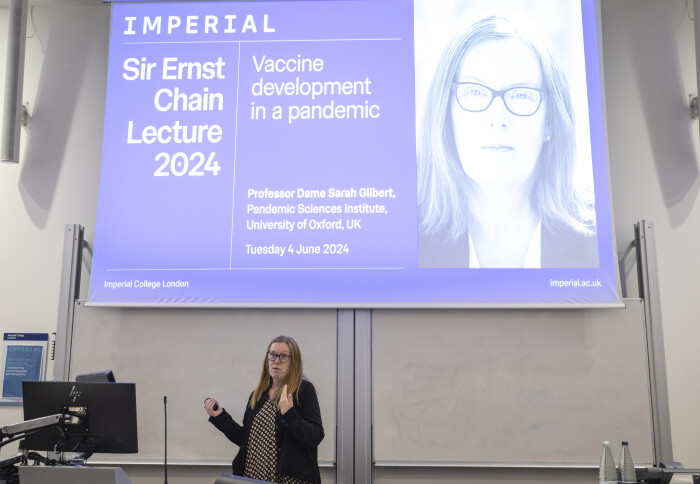Sir Ernst Chain Lecture 2024 – Vaccine Development in a Pandemic
by Emily Govan

This year’s Ernst Chain lecture was given by Professor Dame Sarah Gilbert of the Nuffield School of Medicine, University of Oxford.
Entitled ‘Vaccine Development in a Pandemic’, it was an inspiring and thought-provoking talk that demonstrated the transformative power of “knowing your stuff.”
The annual lecture, hosted by the Department of Life Sciences, commemorates the achievements of Sir Ernst Chain, both for humankind and for the establishment of the Biochemistry Department, a predecessor of the current Department of Life Sciences. The lecture has become one of the most prestigious events in Imperial’s calendar.
Professor Sarah Gilbert
Professor Gilbert’s chief research interest is the development of viral vectored vaccines that work by inducing strong and protective immune responses. She leads work on influenza vaccine development as well as vaccines for many different emerging pathogens, including Nipah virus, Middle East Respiratory Syndrome (MERS), and Lassa virus. Her work also focuses on the rapid transfer of vaccines into GMP manufacturing and first in human trials.
Professor Gilbert was the Oxford Project Leader for ChAdOx1 nCoV-19, a vaccine against the novel coronavirus SARS-CoV-2. The vaccine, tested by the University of Oxford in clinical trials of over 23,000 people in the UK, Brazil and South Africa, was subsequently used in over 180 countries in the fight against the Covid-19 Pandemic is estimated to have saved more than six million lives in its first year of use.
Sir Ernst Chain Lecture 2024
This year’s event was well-attended by staff and students from across the department and the university, by alumni and interested members of the general public. There were also three generations of the Chain family in attendance!
The event began with introductions from Imperial's President, Hugh Brady and Professor Dan Davis, Head of Department, Life Sciences.
Professor Gilbert, from the University of Oxford, discussed the 2014 outbreak of Ebola virus disease in West Africa, which highlighted the lack of preparedness for combating infectious disease outbreaks. Since 1976, vaccine development had proceeded slowly and no candidate vaccines had progressed further than phase I trials. Ebola is only one of many known viruses with the potential to cause outbreaks. With the support of the WHO in identifying priority pathogens, and the formation of CEPI to provide funding, vaccine development was initiated with the aim of having vaccines available in readiness for future disease outbreaks.
"For the future we need to be much better prepared to respond to outbreaks, epidemics and pandemics, wherever they may arise, and that will require a broad and well-coordinated approach across multiple different disciplines." Professor Sarah Gilbert
‘Disease X’, to represent a disease caused by a previously unknown pathogen, was also considered. In the first days of 2020, the first ‘Disease X’ outbreak, caused by a virus later named SARS-CoV-2 occurred. Vaccine developers found themselves attempting to put into place plans that were at an early stage of development, had not been funded and had not therefore been tested. Rather than working to produce a vaccine which could then be deployed in the ‘outbreak area’, it was necessary to attempt to develop a vaccine against a novel pathogen that was causing a pandemic whilst the whole world was in the grip of that pandemic.
Professor Gilbert said: ‘In 2014, it took the world far too long to wake up to the dangers posed by the rapidly spreading Ebola outbreak in West Africa.
This failure was subsequently acknowledged by those working in outbreak response, and there was a new focus on preparing to respond more effectively to emerging epidemics. Then in 2020, we found ourselves amidst a global pandemic, for which we were not adequately prepared.
For the future we need to be much better prepared to respond to outbreaks, epidemics and pandemics, wherever they may arise, and that will require a broad and well-coordinated approach across multiple different disciplines.’
The talk was followed by a lively Q&A led by Professor Faith Osier, who also gave the vote of thanks.

"This was a most fitting topic to commemorate the founder of our Department, Sir Ernst Chain, who was awarded a Nobel prize for the development of penicillin. We were particularly honoured that three generations of the Chain family joined us for the lecture." Professor Mike Sternberg
Professor Mike Sternberg said: ‘Dame Sarah Gilbert gave a fantastic presentation about the development of the Covid vaccine and the challenges to develop vaccines for future pandemics. This was a most fitting topic to commemorate the founder of our Department, Sir Ernst Chain, who was awarded a Nobel prize for the development of penicillin. We were particularly honoured that three generations of the Chain family joined us for the lecture.’
Professor Dan Davis said: ‘It is very rare to have the opportunity to hear from a scientist like Dame Sarah Gilbert, whose work has affected us all, so deeply and so profoundly. Her lecture will be something that many of us will remember for a long time to come.’
Watch Professor Gilbert's lecture above or click this link.
Article text (excluding photos or graphics) © Imperial College London.
Photos and graphics subject to third party copyright used with permission or © Imperial College London.
Reporter
Emily Govan
Department of Life Sciences
